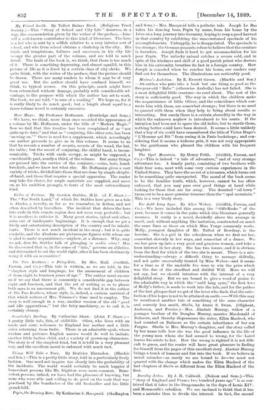For Auld Lang Syne. By Alice Weber. (Griffith, Farran, and
Co.)—We have included this among the " Gift-Books " of the year, because it comes in the guise which this literature generally assumes. It really is a novel, decidedly above the average in merit, and, without anything like imitation, constructed on much the same lines as those on which Miss Yonge commonly works. Molly, youngest daughter of Mr. Talbot of Bowdray, is the heroine. She is a girl in the schoolroom when we first see her, somewhat slovenly in her ways, and somewhat of a dunce. We see her grow up into a very good and gracious woman, and take a keen interest in her story. She has two lovers, and it is obvious from the first for which of the two she is meant. There is a mis- understanding—always a difficult thing to manage skilfully, and not quite successfully treated by Miss Weber—and it seems for a time as if the unstable No were to win the prize which was the due of the steadfast and dutiful Will. More we will
not say, lest we should interfere with the interest of a very delightful story. But we are bound to give a word of praise to the admirable way in which the " auld lang sync," the first love of Molly's father, is made to work into the tale, and for the pathos
of the last glimpse that we get of the lover who finds that the satis- faction of his hopes is not to be attained on earth.—With this may be mentioned another tale of something of the same character aADnnadldnescarcely iroc asroerne e ya and ESllwe an n Macleod, ( Ol i p wa (Oliphant, d Ferrier.)—Mrs. Alastair Murray, widow of a younger brother of Sir Douglas Murray, marries Macdonald of less merit, Sheila, by sister, Ellen
counted on Dalmore as the certain inheritance of her son Fergus. Sheila is Mrs. Murray's daughter, and the story called by her name tells how she was the good influence in the life of the young man whom she had seemed to wrong, for the Laird leaves his estate to her. How the wrong is righted it is not diffi- cult to guess, and the reader will have great pleasure in finding for himself from the pages of this excellent story. Alastair Murray brings a touch of humour and fun into the book. If we believe in moral miracles—as surely we are bound to do—we must not quarrel with the change which makes the Ellen Macleod of the last chapters of Sheila so different from the Ellen Macleod of the first.










































 Previous page
Previous page